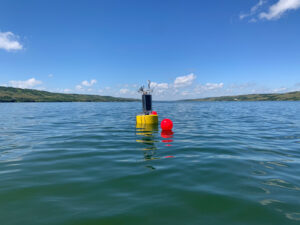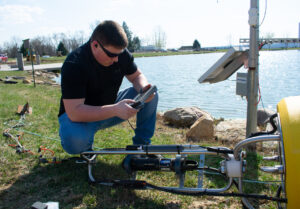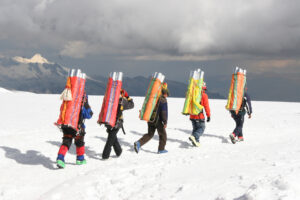Lufft WS500 Multi-Parameter Weather Sensor
Features
- Ventilated housing allows more accurate measurements in high radiation conditions
- Easily mounts to 2" diameter pipe with integrated bracket mount & U-bolts
- SDI-12 output for integration with NexSens and other data loggers
- Free ground shipping
- Expedited repair and warranty service
- Lifetime technical support
- More
Overview
The Lufft WS500 Multi-Parameter Weather Sensor simultaneously measures air temperature, humidity, pressure & wind with an integrated electronic compass for corrected wind direction on moving platforms.
Air Temperature & Humidity
Temperature is measured using a highly accurate NTC-resistor, while humidity is measured using a capacitive humidity sensor. Both sensors are located in a ventilated radiation shield to reduce the effects of solar radiation.
Pressure
Absolute air pressure is measured using a built-in MEMS sensor. The relative air pressure referenced to sea level is calculated using the barometric formula with the aid of the local altitude, which is user-configurable on the equipment.
Wind Speed & Direction
The wind sensor uses four ultrasound sensors which take cyclical measurements in all directions. The resulting wind speed and direction are calculated from the measured run-time sound differential.
Compass
The integrated electronic compass can be used to check the north-south adjustment of the sensor housing for wind direction measurement. It is also used to calculate the compass-corrected wind direction.
- Air Temperature
- Principle: NTC
- Measuring Range: -50 to +60 C
- Resolution: 0.1 C (-20 to +50 C); otherwise 0.2 C
- Accuracy: +/-0.2 C (-20 to +50 C); otherwise +/-0.5 C
- Units: C; F
- Humidity
- Principle: Capacitive
- Measuring Range: 0 to 100% RH
- Resolution: 0.1% RH
- Accuracy: +/-2% RH
- Units: % RH; g/m3; g/kg
- Pressure
- Principle: Capacitive
- Measuring Range: 300 to 1200hPa
- Resolution: 0.1hPa
- Accuracy: +/-1.5hPa
- Unit: hPa
- Wind Speed
- Principle: Ultrasonic
- Measuring Range: 0 to 60m/s
- Resolution: 0.1m/s
- Accuracy: +/-0.3m/s or 3% (0 to 35m/s); +/-5% (>35m/s)
- Response Threshold: 0.3m/s
- Units: m/s; km/h; mph; kts
- Wind Direction
- Principle: Ultrasonic
- Measuring Range: 0 to 359.9 degrees
- Resolution: 0.1 degrees
- Accuracy: +/-3 degrees
- Response Threshold: 0.3m/s
- Compass
- Principle: Integrated Electronic Compass
- Measuring Range: 0 to 359.9 degrees
- Resolution: 1.0 degree
- Technical Data
- Interface: SDI-12, Modbus
- Operating Temperature: -50 to +60 C
- Operating Humidity: 0 to 100% RH
- Included Cable Length: 10m
- (1) WS500 Multi-Parameter Weather Sensor
- (1) 10m sensor cable
- (1) Operations manual
In The News
Combating Water Insecurity in Saskatchewan with Real-Time Data
The prairies of Saskatchewan can be described as one of the least water-secure parts of Canada, making water quality monitoring essential for informed resource management in a region already facing water insecurity. While natural physical properties worsen some of the poor water quality conditions in the region, others are connected to land use. Having grown up spending summers on the shores of Lake Huron, Helen Baulch, an associate professor at the School of Environment and Sustainability at the University of Saskatchewan , has always been dedicated to the protection of water resources. Looking back fondly at her childhood playing along the shore, Baulch also recalls the invasion of quagga mussels during her teenage years and watching the lake change as a result.
Read MoreSeametrics Turbo Turbidity Logger: Boost your Turbidity Monitoring
The Seametrics Turbo Turbidity Logger is a self-cleaning turbidity sensor capable of internally logging over 260,000 data records. The sensor enables researchers, compliance officers, and contractors to monitor turbidity in various applications, from construction and dredging sites to wastewater effluent. Due to its narrow width, this device can be deployed in a range of areas, from small well spaces to rivers and streams. The stainless steel housing and built-in wiper allow the sensor to withstand long-term deployments and reduce the need for maintenance trips. The logger accurately records temperature and turbidity up to a depth of 50 meters.
Read MoreCollecting Data at the Top of the World: How Scientists Retrieve Glacial Ice Cores
A helicopter touches down in the small town of Sicuani, Peru, at an elevation of 11,644 feet. Earlier that day, a boxcar brought fuel, drills, food, and other equipment for a glacial expedition. The year is 1979, and glaciologist Lonnie Thompson is preparing to lead a team to the Quelccaya ice cap in hopes of becoming the first scientists to drill an ice core sample from this glacier. The only problem? The glacier is located at 19,000 feet in one of the most remote areas of the world. The helicopter takes off from the town, but the thin atmosphere at that elevation does not allow it to safely touch down on the ice– due to the aircraft’s weight, and it becomes unstable when the air is less dense.
Read More



























